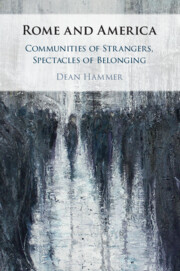Book contents
- Rome and America
- Rome and America
- Copyright page
- Dedication
- Contents
- Figures
- Preface
- Introduction
- Chapter 1 Memory, Identity, and Violence
- Chapter 2 Imagining Purity
- Chapter 3 The Wild Stranger and the Conquest of Space
- Chapter 4 Playing Culture
- Chapter 5 The Experience of Politics and the Crises of Two Republics
- Select Bibliography
- Index
Chapter 2 - Imagining Purity
The Corrosive Stranger and the Construction of a Genealogy
Published online by Cambridge University Press: 22 December 2022
- Rome and America
- Rome and America
- Copyright page
- Dedication
- Contents
- Figures
- Preface
- Introduction
- Chapter 1 Memory, Identity, and Violence
- Chapter 2 Imagining Purity
- Chapter 3 The Wild Stranger and the Conquest of Space
- Chapter 4 Playing Culture
- Chapter 5 The Experience of Politics and the Crises of Two Republics
- Select Bibliography
- Index
Summary
The chapter explores efforts to answer how a community premised on a dislocation from the past, but comprised of people who bring with them their own pasts, locates itself in time. How does a community constituted by other pasts not simply blur into those pasts? I argue that in both Rome and the United States a particular type of Stranger, the corrosive Stranger, is constructed in response to this question. The corrosive Stranger is not defined against some preexistent purity, but is used to construct an imagined purity that gives a community a genealogy that distinguishes it from other communities and also posits a notion of true belonging that is different from juridical membership. I look at the different efforts by Cato the Elder, Cicero, and Varro for the Romans and then by Noah Webster for the United States to craft a genealogy of national identity that is defined against the threats of the corrosive Stranger. I then look at attempts by W. E. B. Du Bois and Booker T. Washington to confront the burden of memory reflected in the Stranger marked by race who carries America’s own memory.
Keywords
- Type
- Chapter
- Information
- Rome and AmericaCommunities of Strangers, Spectacles of Belonging, pp. 58 - 95Publisher: Cambridge University PressPrint publication year: 2023

